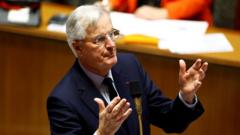The political situation in France is reaching a critical juncture, with Prime Minister Michel Barnier facing likely removal through a no-confidence vote scheduled for Wednesday. This scenario arises after his administration utilized special powers to push through a controversial social security budget on Monday. The anticipated fallout is significant not just for French citizens, as the nation stands at a crossroads of domestic turmoil amid a period of global instability, raising alarm for the European Union (EU).
Traditionally, France and Germany act as the "engine" of the EU; however, both nations are experiencing extensive domestic challenges contributing to a wider sense of unease. Germany is preparing for a snap election in February after its coalition government disintegrated, further complicating the political landscape within the EU. Questions linger about Europe's ability to maintain a united front against external threats, notably from an increasingly aggressive Russia, especially in light of a potential shift in U.S. foreign policy under a new Trump administration.
As President Donald Trump's return to power could potentially alter the landscape of military aid to Ukraine, further complicating Europe's geopolitical strategy, the situation in France adds to these uncertainties. The French electorate is deeply anxious over their country's spiraling budget deficit and rising national debt, contributing to an atmosphere of discontent that echoes throughout the eurozone. Anchoring the bloc is critical, given that France represents the second-largest economy within it.
In the midst of rising tensions, President Emmanuel Macron attempts to project calm, asserting the nation’s economic resilience while his Prime Minister appeals to lawmakers for bipartisanship to shield France from declining stability. Macron's statements from Saudi Arabia, amid the impending vote, contrast sharply with the realities on the ground as his positions and public support wane after recent elections yielded disappointing results for his party.
The political landscape remains fragmented, with no immediate route to resolution. Under French law, the possibility of new parliamentary elections is constrained for at least one year, hindering urgent reforms and exacerbating the current gridlock. Calls for Macron's resignation are gaining traction among various factions within parliament, some viewing it as a potential solution to break the stalemate.
The interplay between Macron's leadership and the ambitions of his long-time political adversary, Marine Le Pen of the National Rally Party, adds further complexity. Le Pen, who faces scrutiny over alleged financial misconduct that could hinder her political aspirations, is undoubtedly shaped by these uncertainties. If Macron resigns, it would trigger a 30-day countdown to a new presidential election, potentially allowing Le Pen to enter the race.
With mounting pressures and significant stakes in play, the events in France resonate far beyond its borders, posing a critical test for the future cohesion and stability of Europe amid a time of intense global challenges.



















